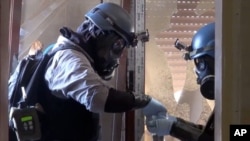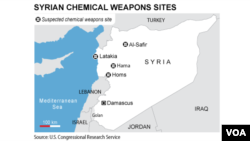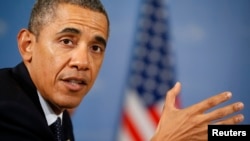Syria is believed to have one of the world's largest arsenals of chemical weapons, a vast collection of sarin, mustard gas and VX nerve agents.
The exact extent of the Syrian cache is unknown outside the country, but Western intelligence agencies believe the regime of President Bashar al-Assad has been annually manufacturing hundreds of tons of the chemical agents at research and production facilities.
There are known chemical weapons sites in such western Syria cities as Homs, Hama, Latakia and Al-Safir and near the capital, Damascus, but some of the agents could be hidden throughout the country.
Syria last year confirmed possession of unconventional weapons, but has never given an inventory of its stockpile. Damascus has never signed a global treaty banning the storage of chemical weapons, but is a signatory to a 1925 treaty prohibiting their use.
Chemical agents of choice
Syria's chemical agents are both debilitating and deadly. Sarin can contaminate food and water, while mustard gas inflicts chemical burns and VX is the most toxic of all nerve agents, poisoning through the skin.
After Syria's suspected sarin attack last month on rebels fighting to overthrow the Assad government killed more than 1,400 people, U.S. President Barack Obama called for a military strike against Syria to deter future use of the nerve agents.
But now Obama and other Western leaders say they are willing to consider a Russian proposal to put the Syrian chemical weapons under international control for their subsequent destruction, which Syria has agreed to.
But the American leader is wary about the ability to find all the Syrian chemical weapons. In an interview Monday, Obama told CBS: "The importance is to make sure that the international community has confidence that these chemical weapons are under control, that they are not being used, that potentially they are removed from Syria and that they are destroyed.''
In another interview on Syria, the president told ABC that the world must maintain its prohibition against the use of chemical weapons.
"I want to make sure that that norm against use of chemical weapons is maintained," he said. "If we can do that without a military strike, that's overwhelmingly my preference."
Potential dangers
Finding all the Syrian chemical weapons, and then dismantling them, could be difficult. Weapons experts say that if the chemical agents have been loaded into missiles, it could be dangerous to disable them or move them out of the country.
U.N. inspectors were fired upon when they first sought to investigate the suspected chemical weapons attack last month, and international agencies have been hard-pressed to determine whether all chemical weapons have been found, even when countries have disclosed information about their arsenals.
In Libya, one-time leader Moammar Gadhafi cooperated with a NATO disarmament program, but after his 2011 downfall, mustard gas was found on military bases.
The exact extent of the Syrian cache is unknown outside the country, but Western intelligence agencies believe the regime of President Bashar al-Assad has been annually manufacturing hundreds of tons of the chemical agents at research and production facilities.
There are known chemical weapons sites in such western Syria cities as Homs, Hama, Latakia and Al-Safir and near the capital, Damascus, but some of the agents could be hidden throughout the country.
Syria last year confirmed possession of unconventional weapons, but has never given an inventory of its stockpile. Damascus has never signed a global treaty banning the storage of chemical weapons, but is a signatory to a 1925 treaty prohibiting their use.
Chemical agents of choice
Syria's chemical agents are both debilitating and deadly. Sarin can contaminate food and water, while mustard gas inflicts chemical burns and VX is the most toxic of all nerve agents, poisoning through the skin.
After Syria's suspected sarin attack last month on rebels fighting to overthrow the Assad government killed more than 1,400 people, U.S. President Barack Obama called for a military strike against Syria to deter future use of the nerve agents.
But now Obama and other Western leaders say they are willing to consider a Russian proposal to put the Syrian chemical weapons under international control for their subsequent destruction, which Syria has agreed to.
But the American leader is wary about the ability to find all the Syrian chemical weapons. In an interview Monday, Obama told CBS: "The importance is to make sure that the international community has confidence that these chemical weapons are under control, that they are not being used, that potentially they are removed from Syria and that they are destroyed.''
In another interview on Syria, the president told ABC that the world must maintain its prohibition against the use of chemical weapons.
"I want to make sure that that norm against use of chemical weapons is maintained," he said. "If we can do that without a military strike, that's overwhelmingly my preference."
Potential dangers
Finding all the Syrian chemical weapons, and then dismantling them, could be difficult. Weapons experts say that if the chemical agents have been loaded into missiles, it could be dangerous to disable them or move them out of the country.
U.N. inspectors were fired upon when they first sought to investigate the suspected chemical weapons attack last month, and international agencies have been hard-pressed to determine whether all chemical weapons have been found, even when countries have disclosed information about their arsenals.
In Libya, one-time leader Moammar Gadhafi cooperated with a NATO disarmament program, but after his 2011 downfall, mustard gas was found on military bases.








